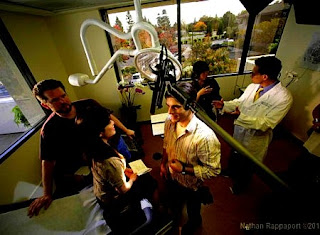Scenes.
They're the anchors for your characters,
allowing them to experience adventures undreamed of. Scenes are the visual elements that, strung together, make navigating your story entertaining and logical.
Scenes
are the pulse of your novel. With each successive beat, characters discover
more, reveal more, and live more. And readers feel that life. The pulse, the
heartbeat of your story, resonates in them, and if the beat is strong enough,
it will keep them connected, not wanting to leave. Not wanting to cut off that
heartbeat that has become part of them.
We
all know what it’s like to be interrupted when we’re at the good part.
Make your story pulse with the good part from beginning to end. Give the reader
not only a vivid character, but vivid scenes that will echo in his mind and
heart. Scenes that will keep him attached to your tale.
Write
them. From page one, write them.
They’re
what’s vibrant about your story.
They
are events
happening in a specific place.
Don’t
tell us Max did this and Sally did that and Mortimer did a little of
both. Don’t give us diary entries or a school report. Don’t even give us a letter
to a pen pal. Putyour characters into a specific time, a specific locale, and
give them a task.
And
once you write your scene, don’t fill pages with delay, describing the route to
an event and then the décor once we get there.
Get to the point.
Dump
us into action. Event. Happening.
Paint
us a picture of someone doing something somewhere.
Think
of a series of events, as in a movie. Write those events. Connect them with
narrative. And then write more events.
Yes,
thinking can be an event. So can dialogue. But events also include someone
robbing a house, a teen learning to drive, a woman kissing a man.
Give
your readers events and action they can dive into. Give them places they can
see, objects they can touch, sounds to hear and wonder over. Write for the
senses and the emotions and the mind. And put your characters in a location.
Don’t
forget that people move and touch and see while they’re interacting.
If
you’re going to use a scene with a lot of thought and/or dialogue—either one
person thinking without interaction with another or multiple characters
speaking back and forth—make sure the reader knows the where and when of the
scene. Don’t write disembodied thoughts for two pages. Put us in a place, show
us why the character is having these thoughts, and then go at those
thoughts.
Think place. Passage of time. Events happening while the
character ruminates or reminisces or cogitates.
Don’t
give us only talking heads, existing independently of all else. (When Elsie was
young, she always brushed her teeth five times a day. Not six. Not four. She .
. . ) If you choose to throw in back story, first show us where the
character is and what brought about these deep thoughts of the past. Does the
character walk around randomly thinking of the past? Or is there something in
the story—related to plot, of course—that drives those reminiscences? Unless
your character is naturally crazy, go for something that sets him off. And
don’t forget to let us know what’s happening while the character is off
remembering. Ground the character—and the reader—in a
place and then do your thing with deep thoughts.
Use
description in scenes, but don’t only describe. Have your
characters interact with their locale, other characters, and their own demons.
Don’t
try to narrate scenes—she
did this and that and then she cried. Make the story events real. Make the
reader live those events, feel those emotions, quiver with pain and gasp with
shock.
Scenes are only one element of good fiction; we still need exposition.
Stories made up of all scenes without a break would be tiresome and
tedious. They’d be flat-out annoying.
Exposition
can do in a few words what can take pages for a scene to accomplish.
My
point is, however, when you do write scenes—and they should
take up most of the page space in a novel—make sure you are actually writing
scenes rather than reports.
I
read many first manuscripts that have no scenes, especially at the story’s
beginning. Think of ways to invite your reader into the story events. Show the
reader those events as they unfold.
Don’t
recite the events—bring the reader in to experience them for herself.
Some examples: (excerpts)
- What I did on vacation—A school report
- What I did on vacation—Fiction (exposition and scene)
- What I did on vacation—Fiction (exposition and scene, a variation)
- What Tessa did on vacation—Fiction (less exposition, more scene)




